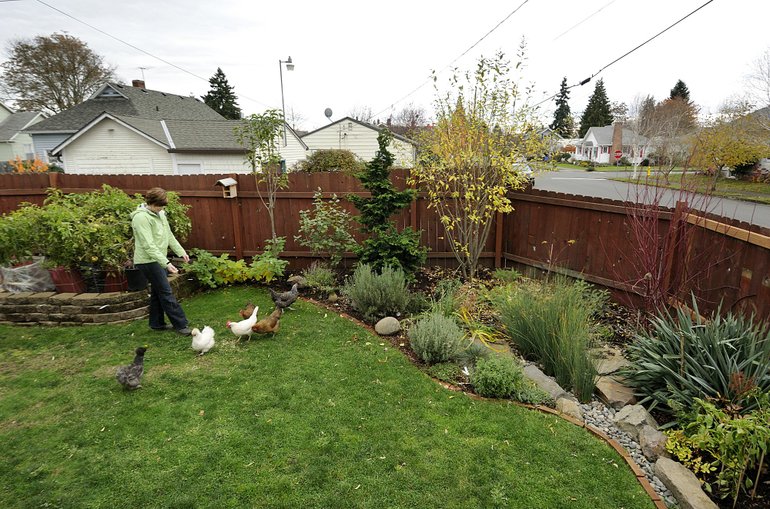Vancouver considers allowing more types of livestock in city limits
By Andrea Damewood
Columbian staff writer
Forget the bounty on your table. Soon enough, more Vancouver residents might be able to raise the fare in their backyards.
The city is considering a few code changes that may expand the types of livestock that can live within city limits.
No, they’re not talking horses and cows on a postage-stamp lot downtown, but rather minigoats, llamas and maybe even a sheep or two in big backyards across the city.
The city already allows for as many chickens as an egg lover could want (as long as your henhouse isn’t a pigsty), and even allows small pot-bellied pigs.
“A lot of people are surprised to learn that we have no limits on chickens,” Vancouver senior planner John Manley said. “If you control the smell and control the noise. If it doesn’t bother your neighbors, it doesn’t bother us.”
With neighborhood relations in mind, Vancouver will certainly remain a no-fly zone for notoriously noisy roosters and peacocks, he said. Turkeys and most ducks are also probably too full of gobble and quack to live on smaller city lots.
An advisory group — which includes city staff members, local food advocates and neighborhood association heads — is still working on the particulars of which animals would live on what size of lot. City noise and nuisance laws will remain firmly in place, Manley added.
The group will meet again Dec. 1 and have a proposal ready for public comment in January, Manley said.
The changes are proposed so that Vancouver’s urban livestock code is similar to Clark County’s, which adjusted its regulations last month, Manley said.
But another part of the charge has been led by the popularity of homegrown food.
Carter Park area resident Rachel Knowlton said she supports the idea of her neighbors with larger lots having a goat or two.
The 35-year-old biological scientist and graduate student has kept chickens in her yard for 2½ years. Right now, she has six chickens that lay one or two eggs a day.
“It’s a huge advantage, because I know exactly what my chickens are eating and I know where my eggs come from,” Knowlton said.
The chickens fertilize her backyard garden and keep it bug free, and she can feed the fowl her leftover vegetables.
Adding other food-producing animals would be wonderful if she had more space, she said.
“I just think it’s better to have options,” Knowlton said. “If I had enough property, I’d totally have a goat.”
Carter Park Neighborhood Association President Glenna Bowman is on the city’s urban livestock advisory group — and is the proud owner of nine chickens.
She has a 0.3 acre-lot that will likely be large enough to house midsized livestock if the city council allows the code changes.
Currently, the city requires owners have 1 acre of property for one livestock animal, and 10,000 square feet of space for each additional animal after that.
Bowman said there are advantages to having a couple of small milking goats: “I like goat cheese, and I don’t like blackberry vines.”
But, she added, the daily grind of morning milkings may keep her from adding to her menagerie.
The one thing Bowman’s not worried about is any nuisance to neighbors.
The code would require that animals can’t access neighbors’ property, and that their shelters are positioned so that doors face away from neighboring lots.
Bowman added that the minigoats being considered for city dwelling bleat much less than larger goat breeds, which probably won’t be allowed.
She said she’s excited that Vancouver has the potential to give homegrown food advocates more flexibility.
“They’re waking up to the fact that people need to be able to provide their own food,” Bowman said. “If you have property you are able to do that on, you should be able to do it.”



